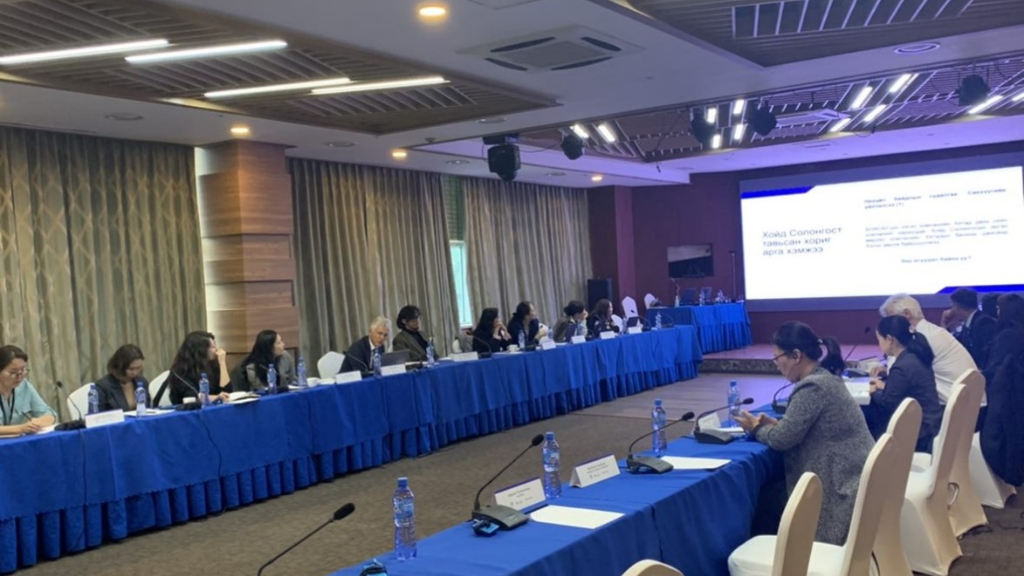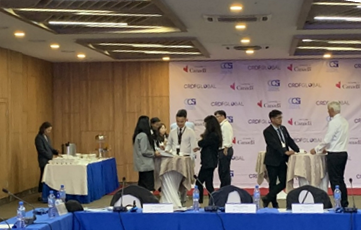CRDF Global Leads Capacity-Building Workshop for Public and Private Sector Professionals in Mongolia to Effectively Implement and Comply with UN Sanctions on North Korea

By Shane Curran, Intern, CRDF Global
To strengthen the capacity of the Mongolian government and private sector to identify, report, and investigate North Korean sanctions evasion activities, CRDF Global convened public and private sector compliance professionals for an in-person workshop in Ulaanbaatar, Mongolia on July 27–28, 2022. With the generous support of Global Affairs Canada’s (GAC) Weapons Threat Reduction Program (WTRP), CRDF Global partnered with the compliance firm Compliance and Capacity Skills International (CCSI) to train 22 participants on a variety of topics, such as the functions of UN Security Council Resolutions, an overview of Financial Action Task Force (FATF) recommendations, the typologies of Democratic People’s Republic of Korea (DPRK) sanctions violators, cybersecurity resiliency, and effective maritime security, with the goal of restricting opportunities for the DPRK to generate revenue for its weapons of mass destruction (WMD) programs.
The workshop allowed participants to augment their awareness of DPRK illicit activities, build meaningful industry connections, and develop comprehensive compliance strategies through discussions with leading UN sanctions experts, financial professionals, legal scholars, and cybersecurity consultants.
Combatting North Korea’s Malign Influence in Mongolia
The DPRK has historically pursued various illicit activities in Mongolia and Central Asia as part of the country’s strategic plan to fund its WMD programs. For example, according to a March 2022 UN Panel of Experts report, the UNICA (IMO No. 8514306), a stateless vessel that has been highlighted by the Panel for illicit deliveries of petroleum to the DPRK, transmitted a “fraudulent identifier” via a Mongolia-associated Maritime Mobile Service Identity (MMSI) in 2021. Furthermore, according to a 2016 report, North Korean diplomats have smuggled sanctioned luxury goods, such as high-end watches and electronics, through Mongolia in order to generate revenue for the regime. North Korea has continued to expand its malign operations and has been increasingly involved in emerging revenue-generating areas, such as cryptocurrency.

Countering the Proliferation Threat through Capacity Building
To maximize the impact of the two-day in-person training, CRDF Global worked with CCSI to create a comprehensive agenda that allowed expert presenters to speak on a variety of critical topics relevant to the Mongolian audience.
Ms. Munkhzul Sainbayar, a Foreign Policy and Diplomacy Officer at the Embassy of Canada in Mongolia, gave the opening remarks during which she underscored the necessity for public-private cooperation and reaffirmed the importance of capacity-building training to strengthen the implementation of UN sanctions. Following the opening remarks and a brief introduction from Mr. Enrico Carisch, the Lead Expert Trainer and Managing Director at CCSI, the participants immediately engaged in an interactive tabletop exercise that explored three hypothetical compliance scenarios and tested their ability to come up with meaningful solutions as a group. The implementing team noted that this early immersive session helped spur sustained communication between the participants and instructors, which enhanced the overall value of the workshop.
Following the tabletop exercise, Capt. (ret.) Neil Watts, CCSI Senior Expert Trainer on Maritime Security and Surface Weapons Systems and a former UN Security Council Panel of Experts member, presented the typologies of DPRK sanctions violators and offered an overview of UN sanctioned individuals, entities, and vessels from North Korea. The first day of training concluded with a discussion of Mongolia’s position as a nuclear weapons-free zone as well as the human rights impacts of North Korean illicit activity.
The second day of training continued to build participants’ knowledge of compliance topics. Durra Sahtout, a Cybersecurity Specialist at CCSI, highlighted DPRK cyber operations through an assessment of advanced tools, such as the dark web and block chain technology, which are used by DPRK actors like the Lazarus Group. Participants were made aware of the importance of financial sanctions enforcement and were given strategies, such as implementing risk assessments, Know-Your-Customer protocols, asset freezing, and public-private information sharing, that can aid the financial integrity of their institutions. Finally, the workshop concluded with another tabletop exercise and a moderated discussion on compliance strategies that could be implemented in the Mongolian public and private sectors moving forward.
The workshop continued CRDF Global and GAC’s efforts to promote gender equality in the fields of sanctions compliance and international security. Notably, women represented 64 percent of the total attendees over the two-day training.
Reflecting on the success of the engagement, CRDF Global Project Lead Keith Beizer noted that “this vital work will empower Mongolian professionals to strengthen their compliance architectures, develop sustainable training courses, and heighten their vigilance against potential exploitation by the DPRK and its affiliates.” Participants expressed similar positive feedback, with one individual stating that they would “highly support the idea of another session or series of workshops in Mongolia.” Another attendee added that “it is not often that we get a chance to rub shoulders with high-level industry experts who can share hands-on experiences and insights.”
Given the overwhelmingly positive responses from participants, CRDF Global is planning further engagements in Mongolia, as it continues its efforts to spur public-private partnerships and build domestic resilience in the face of North Korean illicit activities. With that in mind, CRDF Global will continue to leverage its regional office in Almaty, Kazakhstan, which proved invaluable in providing travel and logistics coordination and supporting the successful implementation of this event.
Shane Curran is an Intern on the DPRK Counterproliferation team at CRDF Global and a graduate student in the Master of Science in Foreign Service (MSFS) program at Georgetown University. Prior to joining CRDF Global, he worked as a Commercial Banking and Global Trade Finance Analyst at HSBC Bank Canada.



